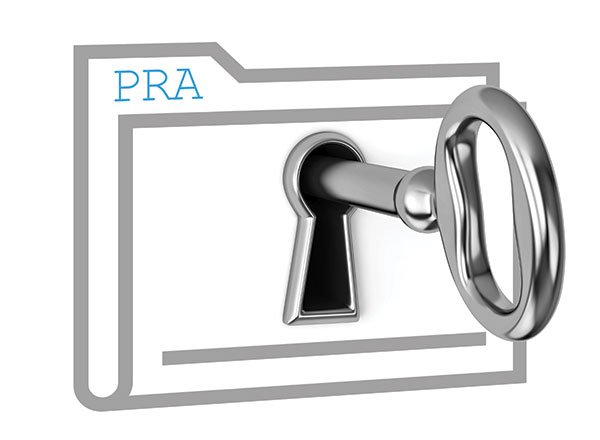
Your Right to Know Report
Perspectives | 8
The following essays represent the analysis and viewpoints of their authors.
Finding 3: Agencies Often Fail to Properly Maintain, Organize and Disclose Records
Many Agencies Fail to Adequately Organize Their Records
State law says agencies must adopt rules to protect and organize records. But many agencies failed to keep pace with the digital revolution, leaving them weighed down with poorly organized electronic records that require costly and time-consuming searches. As a result, many requesters face unnecessary delays, and officials often blame the Public Records Act -- rather than their own records management -- for devouring staff time.
For more than 50 years, the Public Records Act (PRA) has required agencies to organize their records, making it easier for officials to find documents and fulfill records requests. But most agencies have failed to efficiently organize their growing volumes of digital records, resulting in records searches that are more time-consuming and costly. The drafters of the 1972 Washington Public Disclosure Act (now PRA) understood that public records must be properly organized, and that disorganized public records are a significant impediment to transparency, making prompt and complete responses difficult. The PRA has always required agencies to keep their records organized. RCW 42.56.100, part of the original 1972 initiative, provides:
Agencies shall adopt and enforce reasonable rules and regulations … consonant with the intent of this chapter to provide full public access to public records, to protect public records from damage or disorganization, and to prevent excessive interference with other essential functions of the agency. … Such rules and regulations shall provide for the fullest assistance to inquirers and the most timely possible action on requests for information.
This section of the PRA recognizes that the goals of fullest assistance and the timeliest possible action on PRA requests cannot be achieved unless public records are kept organized. Consequently, an agency’s responsibilities under the PRA start with keeping public records organized. An agency that fails to keep its records properly organized is in violation of the PRA. When the PRA was enacted most public records were on paper, kept in notebooks or filing cabinets. But even then, the PRA explicitly applied to all forms of electronic records.
The computer revolution should have improved transparency and reduced the cost of complying with the PRA. Unfortunately, agencies started creating huge amounts of electronic records without adopting meaningful procedures for organizing them. Government employees routinely create Microsoft Word or Excel documents without proper file names and without saving these documents in file structures where they can be easily identified. Many government agencies still have no rules restricting the use of private devices or accounts for government business and have only reluctantly accepted that government records on private devices are public records at all.

Agency attorneys have contributed to this problem by acting in the interests of public officials who want to keep using their private devices for government communications instead of acting in the interests of their agencies by stopping these practices. The inexcusable failure of the city of Seattle to retain the electronic communications of city officials, including the mayor, during controversial Black Lives Matter protests on Capitol Hill in 2020 was the direct result of more than a decade of statewide agency resistance to the idea that emails and text messages on privately owned devices are public records subject to the PRA.
Most PRA officers mistakenly believe that it is not their job to keep agency records organized, and most agencies have no meaningful rules for the organization of public records. Instead, PRA officers are merely investigative clerks who attempt to locate disorganized records in response to PRA requests. And when an agency’s chronic lack of organization makes it difficult and time-consuming to respond to a PRA request, PRA officers and their attorneys frequently complain about the burden of searching large amounts of disorganized records.
Messy records = messy searches
The lack of proper organization makes it necessary for requesters to make broad requests and sift through unwanted records to ensure that the desired records are located and produced. Keyword searches frequently produce large amounts of unwanted records, which may be produced in batches, thereby extending the time required for a complete response. Agencies will often require a requester to purchase an installment of useless, nonresponsive records identified by keywords, and refuse to continue searching until payment is made. Records identified using keyword searches are produced in the order in which they are located or reviewed, which is often unrelated to the logical order such records would have if properly organized.
The state Office of the Attorney General (OAG) has not only failed to take the lead to bring agencies into compliance with RCW 42.56.100, but has actively resisted the idea that agencies have any legal obligation to actually organize their records. The OAG is charged with promulgating model rules for agencies, but it has consistently failed to promulgate meaningful rules for the organization of electronic records. The OAG even refused to adopt proposed rules that would have addressed these organization issues.
In 2017, the Attorney General undertook a formal rulemaking process to update the PRA model rules. In response, WashCOG explained that the existing model rules failed to implement the agencies’ duty to keep public records properly organized. WashCOG proposed specific rules to restrict the use of personal computers, devices, email or text accounts and social media, and to require that all public records be retained on computers controlled by the agency.
WashCOG also proposed specific rules for the organization of several types of public records, rules intended to improve PRA compliance while reducing the need to search for, review and redact records in response to PRA requests, including:
- rules for file names and filing systems that contain public records so that responsive records can be located by subject matter as opposed to ineffective and time-consuming key word searches
- rules restricting the use of social media, and requiring agencies to organize and store their social media data
- rules for email communications including consistent, meaningful subject lines, the storage of attachments, and the logical organization of email records as opposed to allowing emails to accumulate in email Inbox and Sent Items folders
- rules for retaining word processing files so that earlier versions of government records are not destroyed or overwritten
- rules requiring frequently used government forms to limit the inclusion of exempt information and to clearly identify exempt information to reduce timely record reviews and ad hoc redactions
- rules for creation and retention of records of how agencies search for records in response to PRA requests
- rules requiring agency attorneys to identify and segregate records containing privileged information or work product to reduce the need for attorneys to review or redact records
- rules requiring all records involving outside legal counsel to be retained by the agency itself
- rules requiring multi-agency organizations to either directly comply with the PRA as agencies or ensure that records of an agency’s participation in the organization are organized and retained by the agency itself. Unfortunately, the OAG erroneously interprets the agencies’ obligation to keep records organized as merely an obligation to protect public records from the public. The OAG rejected all of WashCOG’s proposed rules for organizing specific types of records and adopted a toothless rule that focuses on the nonexistent problem of preventing requesters from damaging public records. As a result, agencies still have not adopted proper rules for organizing records, and PRA compliance still suffers.
The chronic failure of agencies to comply with this part of the PRA has resulted in slower PRA responses, increased cost for agencies, and political pressure to weaken the PRA. Agencies in Washington state need to start complying with their legal obligation to keep all public records organized. WashCOG intends to push agencies to improve their records organization, to compel the OAG to adopt proper model rules, to take legal action against recalcitrant agencies, and to hold anti-transparency public officials, employees and attorneys accountable. The public can assist with these efforts when requesting records by reminding agencies that they have an obligation to keep records organized, by demanding that agencies perform logical searches of agency records before relying on keyword searches, and by requesting a copy of an agency’s rules for organizing its records.
William John Crittenden is a Seattle attorney and a member of WashCOG’s board. He often represents requesters, and he has represented WashCOG in separate open-government lawsuits against San Juan County, the Washington State Association of Municipal Attorneys, the state Department of Corrections and Pierce County.
